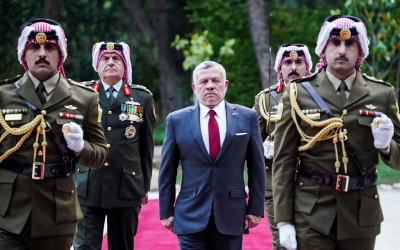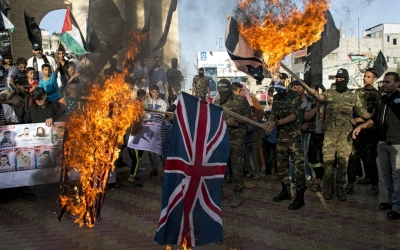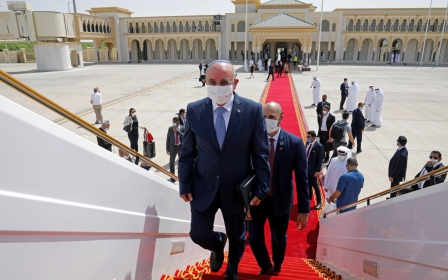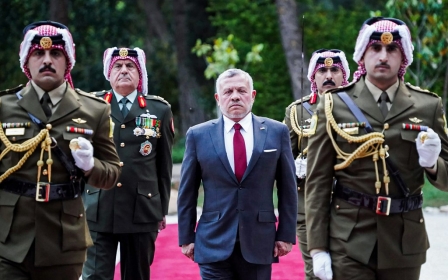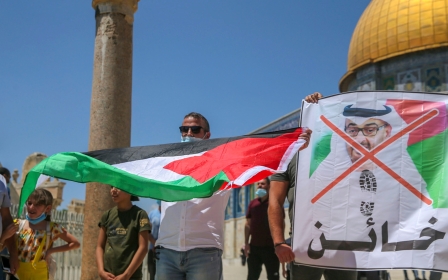Israel-UAE deal: Will Jordan's custodianship of the Al-Aqsa Mosque be affected?
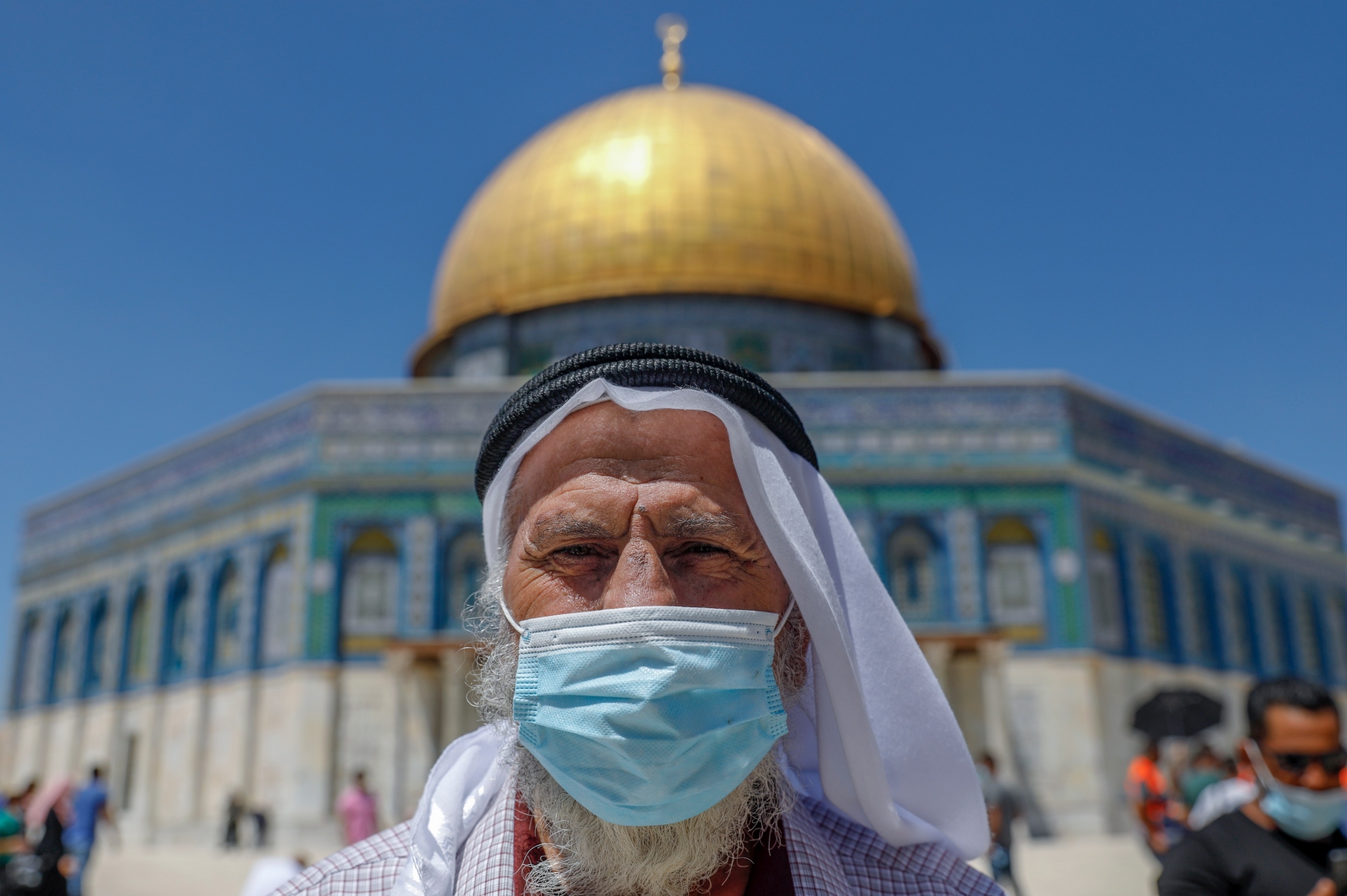
The announcement on 13 August that Israel and the United Arab Emirates had reached an agreement paving the way for official diplomatic relations between the two states has prompted many critical reactions - particularly from Palestinians, as those most affected by regional normalisation with Israel.
But in neighbouring Jordan, authorities have also looked on with a degree of apprehension at how the developments might affect the Hashemite kingdom.
A report by Israeli NGO Terrestrial Jerusalem has warned that the phrasing of an initial joint statement by US President Donald Trump, Israeli Prime Minister Benjamin Netanyahu and Abu Dhabi Crown Prince Mohammed bin Zayed implied changes in the status of religious sites in occupied East Jerusalem over which Jordan has had custodianship for nearly a century.
The statement says that "all Muslims who come in peace may visit and pray at the Al-Aqsa Mosque, and Jerusalem's other holy sites should remain open for peaceful worshippers of all faiths".
The status of Christian and Muslim holy sites in Jerusalem has long been a sensitive topic - with none the focus of more tension than the Al-Aqsa Mosque compound, also known as Haram al-Sharif.
The ambiguous framing of the statement directly affects Hashemite custodianship, but Jordanian authorities have been cautious about jumping into the fray.
"This is a very sensitive topic," a senior Jordanian official responsible for Jerusalem affairs, who asked not to be identified, told Middle East Eye, adding that the country had to take into account the "thousands of Jordanians working in the Emirates" who might be affected should Amman come out strongly against any changes to the status quo.
Historic role under threat?
Jordan has been the official custodian of Christian and Muslim holy places in Jerusalem since 1924, when Sharif Hussein, the initiator of the Great Arab Revolt against the Ottoman Empire, was publicly acclaimed as the custodian of Jerusalem's holy sites.
Even after Jordan relinquished its claim to sovereignty over the occupied West Bank in 1988, it never abandoned its custodianship of holy places in Jerusalem.
The 1994 Wadi Araba peace treaty between Israel and Jordan officially recognised Amman's role as a religious custodian.
In 2013, an agreement between Jordan and Palestinian Authority President Mahmoud Abbas further officialised Jordan's role in Jerusalem until the establishment of a Palestinian state.
Jordan has held on to the Ottoman-era status quo agreement, which notably states that while non-Muslims are allowed to enter the Al-Aqsa Mosque compound, they cannot worship or pray in Haram al-Sharif.
These rules have long been rejected by some Israelis, as Haram al-Sharif is believed to have been built where the First and Second Jewish Temples once stood - with some far-right Israeli figures openly advocating for the destruction of Al-Aqsa so a Third Temple can be built in its place.
The vague formulation of the Israeli-Emirati statement has therefore raised fears that Muslims may see their rights curtailed at Haram al-Sharif - particularly as it only made mention of Muslims worshipping at the Al-Aqsa Mosque, and not the whole compound surrounding it.
On Tuesday evening, the Jordanian Foreign Ministry reiterated Amman's stance that "the blessed Al-Aqsa Mosque and Haram al-Sharif with its 144 dunams (35.5 acres), is a mosque exclusively for Muslims, and they alone have the right to pray there".
"International law affirms that it is not permissible for occupying powers to change the status quo," the ministry added in response to an MEE request for comment, while making no mention of the UAE. "Israel, the occupying power in occupied East Jerusalem, must respect its obligations under international law and international humanitarian law, and respect the legal and historical status quo. Israel must also respect the sanctity of the mosque, the feelings of Muslims and Jordan's role in caring for the holy sites."
A 'new Balfour'
Jordanian relations with the Emirates have been shaken since the deal was announced. Prince Ali bin Hussein, the half-brother of King Abdullah II, shared an article online critical of the normalisation agreement, reportedly causing a diplomatic stir.
Meanwhile, Jordanian cartoonist Emad Hajjaj was detained for three days last week over a drawing critical of Mohammad bin Zayed.
Jordanian personalities have, however, not kept quiet in the wake of the Terrestrial Jerusalem report.
Ribhi Halloum, the head of the Jordanian writers' union's Jerusalem committee and a former member of the Palestine Liberation Organisation in the UAE, said the possibility of losing custody of Al-Aqsa and other Jerusalem holy sites would amount to a "new Balfour declaration".
"This is treason against history, religion and Arab values, as well as Jordan's custodianship of the holy places, and a direct hostile act against the people of Palestine and its holy places," he told MEE.
Hael Daoud, the former Jordanian Minister of Waqf - religious endowment - told MEE he was cautious about making assumptions.
'Those who have no right can't give away to those who are undeserving'
- Hael Daoud, former religious endowment minister
"I don't know if there were any promises in the UAE-Israel deal regarding Jerusalem, but I doubt it, because the UAE knows that it doesn't own anything in Jerusalem," he said.
"Those who are concerned about Jerusalem are the Palestinian people first and foremost, and Jordan as the Hashemite custodian of the holy sites.
"I doubt very much that there is any promise in this regard, because those who have no right can't give away to those who are undeserving," Daoud added.
Palestinian journalist Daoud Kuttab said he bore few illusions about where the Gulf state stood, given that the normalisation deal had been brokered with much fanfare by US President Donald Trump, a fervent supporter of Israel.
"When the Emirati ambassador attended the announcement of the Trump plan, and when the Emirates agreed to the statement that included the American vision, this automatically confirmed Emirati support for the right of Jews to pray in the holy mosque compound in Jerusalem," Kuttab told MEE.
On condition of anonymity, an official Jordanian source warned any efforts that "affect the historical situation of the Al-Aqsa Mosque will have serious consequences" - without elaborating what such consequences might be.
The official noted how previous incidents during which the status of Al-Aqsa was perceived as threatened led to popular upheaval.
The storming of Haram al-Sharif by Israel's then-prime minister Ariel Sharon in 2000, which sparked the Second Intifada; the 1996 protests when Netanyahu inaugurated a tunnel near the compound; or the more recent protests in 2019, after a gate to the compound was closed by Israeli forces.
These milestones are among many examples, the official said, of when "the people of Jerusalem stood up to protect and preserve their holy mosque".
While it remains to be seen whether the Israel-UAE deal will trigger any changes in Jerusalem, the official says Jordan will stand by its long-standing position: "Jordan's position regarding Al-Aqsa is that any violation of the status quo there is a red line."
Middle East Eye propose une couverture et une analyse indépendantes et incomparables du Moyen-Orient, de l’Afrique du Nord et d’autres régions du monde. Pour en savoir plus sur la reprise de ce contenu et les frais qui s’appliquent, veuillez remplir ce formulaire [en anglais]. Pour en savoir plus sur MEE, cliquez ici [en anglais].


